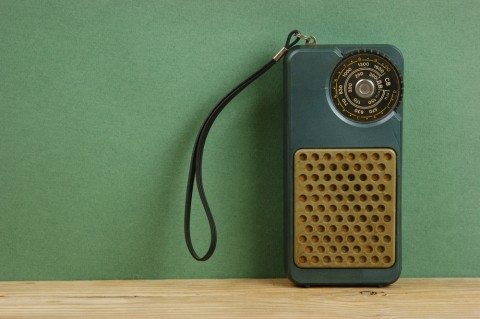We’ve written about Michael Shermer before. (Click here, too.)
He’s the founding publisher of Skeptic magazine, the executive director of the Skeptics Society, and a monthly columnist for Scientific American. In his column for Scientific American on September 16, he wrote about an experience with synchronicity that seems to have drilled into his skeptic’s amour.
His fiancé’s belongings were shipped to the United States from Germany, and among them was her grandfather’s 1978 transistor radio. Her grandfather had died when she was 16 and she’d been quite close to him.
The radio had been silent for decades, and Shermer couldn’t get it working again. It continued its silence in the back of a desk drawer in the couple’s bedroom. In June of this year, Shermer and his fiancé were married. After the ceremony, his wife confided that she was feeling lonely, missing her family back in Germany and also wishing her grandfather could have been alive to give her away. The couple walked to the back of the house where they heard music playing, a love song.
They searched for the source of the music, then his wife “shot me a look I haven’t seen since the supernatural thriller ‘The Exorcist’ startled audiences. ‘That can’t be what I think it is, can it?’ she said.
It was the transistor radio in the drawer.
“My grandfather is here with us,” she said, tearfully. “I’m not alone.”
Shermer’s daughter had heard music coming from the radio just before the ceremony started, though the couple had been in the room only moments before without hearing any music. The radio continued to work through the wedding night.
“Fittingly, it stopped working the next day and has remained silent ever since,” Shermer wrote.
This experience led Shermer to conclude, in his column, “We should not shut the doors of perception when they may be opened to us to marvel in the mysterious.”
I first read about this story on Daz’s blog. Then, several days later, Bernard Beitman, a visiting professor of psychiatry at the University of Virginia in Charlottesville, sent me a link to the same story.
Beitman, who has written a scientific paper on synchronicity and has a book on the topic that will be published soon, noted at the end of his email: “He may be converting to a new reality.”
It all fits rather nicely, actually. Some of the most powerful synchronicities occur during the peak moments in our lives – birth, deaths – and, in Shermer’s example, marriage.









“powerful synchronicities occur during the peak moments in our lives – birth, deaths” – when the emotions are perhaps heightened? A lovely example.
It was surely a peak moment for Shermer!
Nice to see you back, Mike, and look forward to posts on your trip!
I love this story. That experienced sure must have freaked out the non-believer.
For sure!
once in a while even a rational eye will see a mystery in this wonderful world
Yes, indeed!
An amazing example of spirit contact. Thats what it takes, personal experience that can’t be dismissed. Reminds me a little bit of the “Ghost Hunters” (I saw them speak last year at Lilydale) – they went into it to debunk the whole business, and 10 years later they’re hanging out with mediums in Lilydale swapping haunting stories……………..
Yeah, it’s a great example of spirit contact. If you go into a place like Lilydale or Cassadaga with the intention of debunking, you won’t emerge as a skeptic!
An amazing story, one that leaves me with a good and hopeful feeling. Of possibilities I have considered but tossed aside. When my mother died, I had a lot of repressed anger and questions, and she haunted me in my dreams. Until I dreamt we sat down u der a tress and we spoke and spoke, and I finall cried with her, and I awoke with a wet pillow. The haunting dreams stopped immediately…
Fascinating story, shadow!
My problem talking with skeptics is that they are so closed-minded to possibilities. I think its because so many of them are really intelligent and their biggest fear is that they will be conned or tricked into believing something that isn’t real. So, their knee-jerk reaction to anything that science can’t prove is a defense mechanism.
However, all it takes is one personal experience where something violated the laws of science in a way that they can’t deny for them to open their eyes to a world of possibility.
I can’t live in a world of certainty and automatic dismissals of unexplained phenomena. I live in a world of possibility and open to whatever comes into my experience. I don’t need a scientist in a double-blind laboratory experiment to prove that my experiences are real before I believe it.
Well said, Nicholas! It seems that for science (generally speaking) your own experience is merely anecdotal until it’s proven in a lab. In one post we did on Shermer he went to incredible lengths to dismiss what was a startling personal synchro.
I love to tell skeptics: “I’ll believe your view about synchronicity when a scientist can replicate it in a laboratory experiment!”
Of course, that’s the joke. If synchros could be created in a lab experiment, they wouldn’t be synchros!
True!!